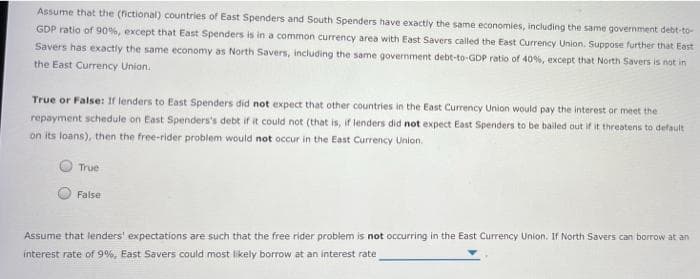Assume that the (fictional) countries of East Spenders and South Spenders have exactly the same economies, including the same government debt-to- GDP ratio of 90%, except that East Spenders is in a common currency area with East Savers called the East Currency Union. Suppose further that East Savers has exactly the same economy as North Savers, including the same government debt-to-GDP ratio of 40%, except that North Savers is not in the East Currency Union. True or False: Ir lenders to East Spenders did not expect that other countries in the East Currency Union would pay the interest or meet the repayment schedule on East Spenders's debt if it could not (that is, if lenders did not expect East Spenders to be bailed out if it threatens to default on its loans), then the free-rider problem would not occur in the East Currency Union. True False Assume that lenders' expectations are such that the free rider problem is not occurring in the East Currency Union. If North Savers can borrow at an interest rate of 9%, East Savers could most likely borrow at an interest rate
Assume that the (fictional) countries of East Spenders and South Spenders have exactly the same economies, including the same government debt-to- GDP ratio of 90%, except that East Spenders is in a common currency area with East Savers called the East Currency Union. Suppose further that East Savers has exactly the same economy as North Savers, including the same government debt-to-GDP ratio of 40%, except that North Savers is not in the East Currency Union. True or False: Ir lenders to East Spenders did not expect that other countries in the East Currency Union would pay the interest or meet the repayment schedule on East Spenders's debt if it could not (that is, if lenders did not expect East Spenders to be bailed out if it threatens to default on its loans), then the free-rider problem would not occur in the East Currency Union. True False Assume that lenders' expectations are such that the free rider problem is not occurring in the East Currency Union. If North Savers can borrow at an interest rate of 9%, East Savers could most likely borrow at an interest rate
Principles of Economics 2e
2nd Edition
ISBN:9781947172364
Author:Steven A. Greenlaw; David Shapiro
Publisher:Steven A. Greenlaw; David Shapiro
Chapter23: The International Trade And Capital Flows
Section: Chapter Questions
Problem 44P: Imagine that the U.S. economy finds itself in the following situation: a government budget deficit...
Related questions
Question

Transcribed Image Text:Assume that the (fictional) countries of East Spenders and South Spenders have exactly the same economies, including the same government debt-to-
GDP ratio of 90%, except that East Spenders is in a common currency area with East Savers called the East Currency Union. Suppose further that East
Savers has exactly the same economy as North Savers, including the same government debt-to-GDP ratio of 40%, except that North Savers is not in
the East Currency Union.
True or False: If lenders to East Spenders did not expect that other countries in the East Currency Union would pay the interest or meet the
repayment schedule on East Spenders's debt if it could not (that is, if lenders did not expect East Spenders to be bailed out if it threatens to default
on its loans), then the free-rider problem would not occur in the East Currency Union.
True
False
Assume that lenders' expectations are such that the free rider problem is not occurring in the East Currency Union. If North Savers can borrow at an
interest rate of 9%, East Savers could most likely borrow at an interest rate
Expert Solution
This question has been solved!
Explore an expertly crafted, step-by-step solution for a thorough understanding of key concepts.
Step by step
Solved in 3 steps

Knowledge Booster
Learn more about
Need a deep-dive on the concept behind this application? Look no further. Learn more about this topic, economics and related others by exploring similar questions and additional content below.Recommended textbooks for you

Principles of Economics 2e
Economics
ISBN:
9781947172364
Author:
Steven A. Greenlaw; David Shapiro
Publisher:
OpenStax



Principles of Economics 2e
Economics
ISBN:
9781947172364
Author:
Steven A. Greenlaw; David Shapiro
Publisher:
OpenStax

